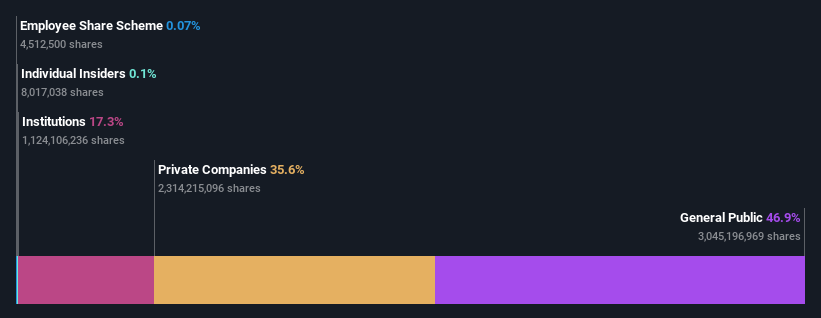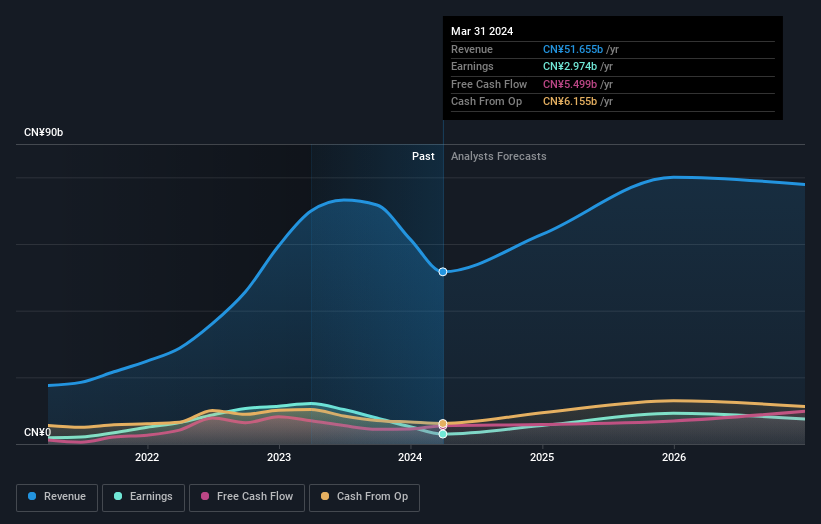- China
- /
- Oil and Gas
- /
- SHSE:600256
Guanghui Energy Co., Ltd.'s (SHSE:600256) market cap surged CN¥2.2b last week, individual investors who have a lot riding on the company were rewarded

Key Insights
- The considerable ownership by individual investors in Guanghui Energy indicates that they collectively have a greater say in management and business strategy
- A total of 18 investors have a majority stake in the company with 50% ownership
- Institutional ownership in Guanghui Energy is 17%
To get a sense of who is truly in control of Guanghui Energy Co., Ltd. (SHSE:600256), it is important to understand the ownership structure of the business. We can see that individual investors own the lion's share in the company with 47% ownership. In other words, the group stands to gain the most (or lose the most) from their investment into the company.
As a result, individual investors were the biggest beneficiaries of last week’s 4.4% gain.
In the chart below, we zoom in on the different ownership groups of Guanghui Energy.
View our latest analysis for Guanghui Energy

What Does The Institutional Ownership Tell Us About Guanghui Energy?
Many institutions measure their performance against an index that approximates the local market. So they usually pay more attention to companies that are included in major indices.
Guanghui Energy already has institutions on the share registry. Indeed, they own a respectable stake in the company. This suggests some credibility amongst professional investors. But we can't rely on that fact alone since institutions make bad investments sometimes, just like everyone does. When multiple institutions own a stock, there's always a risk that they are in a 'crowded trade'. When such a trade goes wrong, multiple parties may compete to sell stock fast. This risk is higher in a company without a history of growth. You can see Guanghui Energy's historic earnings and revenue below, but keep in mind there's always more to the story.

Guanghui Energy is not owned by hedge funds. Xinjiang Guanghui Industry Investment (Group) Corporation Limited is currently the largest shareholder, with 35% of shares outstanding. National Council for Social Security Fund is the second largest shareholder owning 2.1% of common stock, and Foresight Fund Management Company holds about 1.8% of the company stock.
A closer look at our ownership figures suggests that the top 18 shareholders have a combined ownership of 50% implying that no single shareholder has a majority.
While it makes sense to study institutional ownership data for a company, it also makes sense to study analyst sentiments to know which way the wind is blowing. Quite a few analysts cover the stock, so you could look into forecast growth quite easily.
Insider Ownership Of Guanghui Energy
While the precise definition of an insider can be subjective, almost everyone considers board members to be insiders. Company management run the business, but the CEO will answer to the board, even if he or she is a member of it.
I generally consider insider ownership to be a good thing. However, on some occasions it makes it more difficult for other shareholders to hold the board accountable for decisions.
Our data suggests that insiders own under 1% of Guanghui Energy Co., Ltd. in their own names. But they may have an indirect interest through a corporate structure that we haven't picked up on. Keep in mind that it's a big company, and the insiders own CN¥65m worth of shares. The absolute value might be more important than the proportional share. It is always good to see at least some insider ownership, but it might be worth checking if those insiders have been selling.
General Public Ownership
With a 47% ownership, the general public, mostly comprising of individual investors, have some degree of sway over Guanghui Energy. While this size of ownership may not be enough to sway a policy decision in their favour, they can still make a collective impact on company policies.
Private Company Ownership
It seems that Private Companies own 36%, of the Guanghui Energy stock. Private companies may be related parties. Sometimes insiders have an interest in a public company through a holding in a private company, rather than in their own capacity as an individual. While it's hard to draw any broad stroke conclusions, it is worth noting as an area for further research.
Next Steps:
It's always worth thinking about the different groups who own shares in a company. But to understand Guanghui Energy better, we need to consider many other factors. Be aware that Guanghui Energy is showing 3 warning signs in our investment analysis , you should know about...
If you would prefer discover what analysts are predicting in terms of future growth, do not miss this free report on analyst forecasts.
NB: Figures in this article are calculated using data from the last twelve months, which refer to the 12-month period ending on the last date of the month the financial statement is dated. This may not be consistent with full year annual report figures.
New: Manage All Your Stock Portfolios in One Place
We've created the ultimate portfolio companion for stock investors, and it's free.
• Connect an unlimited number of Portfolios and see your total in one currency
• Be alerted to new Warning Signs or Risks via email or mobile
• Track the Fair Value of your stocks
Have feedback on this article? Concerned about the content? Get in touch with us directly. Alternatively, email editorial-team (at) simplywallst.com.
This article by Simply Wall St is general in nature. We provide commentary based on historical data and analyst forecasts only using an unbiased methodology and our articles are not intended to be financial advice. It does not constitute a recommendation to buy or sell any stock, and does not take account of your objectives, or your financial situation. We aim to bring you long-term focused analysis driven by fundamental data. Note that our analysis may not factor in the latest price-sensitive company announcements or qualitative material. Simply Wall St has no position in any stocks mentioned.
About SHSE:600256
Reasonable growth potential with adequate balance sheet.

